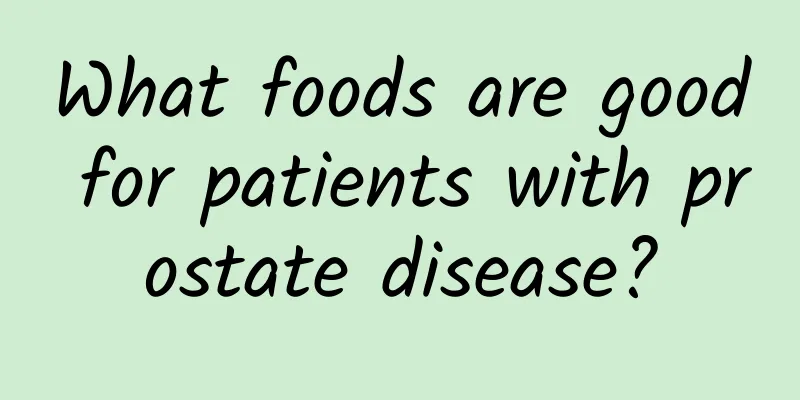What foods are good for patients with prostate disease?

|
The prostate is one of the most important organs for men. If there is a problem with the prostate, men will encounter great troubles in life. For example, if you have frequent intercourse at night and your urine is not clean, it may even affect whether your sex life can proceed normally. To have a healthy prostate, men should eat more of the following foods. Cold can cause prostate disease The prostate gland has abundant adrenergic receptors. When it is cooled, it can easily cause sympathetic nerve excitement, leading to gland contraction and increased urethral pressure, affecting urination. Difficult urination will have an adverse effect on the prostate gland. The vicious cycle can cause prostate disease. Protecting the prostate starts with diet Nowadays, more and more men are suffering from prostate diseases, so prostate health has become the most concerned topic for men. For male prostate, not only professional diagnosis and treatment and drug treatment are needed, but also eating more foods that are beneficial to prostate health in daily life. Pumpkin seeds, walnut kernels Chinese medicine believes that the kidneys store essence, which is related to reproduction, bladder and urination, so eating some kidney-tonifying foods is very good for the prostate. Pumpkin seeds and walnut kernels are not only good kidney-tonifying foods, but pumpkin seeds also have a diuretic function, and walnut kernels have a laxative effect. Therefore, men in old age should eat more pumpkin seeds and walnut kernels to replenish the insufficient kidney qi. Dried Fruits, Grains Men can eat more red beans, mung beans, pumpkin seeds, sunflower seeds, coix seeds, walnut kernels, sesame seeds, etc., because these foods are rich in trace elements and a large amount of B vitamins, have good nutritional effects, and have the functions of clearing heat, reducing fire, killing insects, and moistening the intestines. They can kill bacteria and relieve constipation, make the prostate ducts unobstructed, and eliminate inflammation. Vegetables and fruits To protect the prostate, men can eat more watermelon, cantaloupe, grapes, kiwi, sugarcane, water chestnut, wax gourd, cucumber, etc. Most of these foods are sweet and cool in nature, have the effect of diuresis and stranguria, can clear away heat and detoxify, transform dampness and benefit water, and can play a role in inhibiting prostatitis. Animal viscera Animal offal contains more cholesterol, which is an important component of synthetic sex hormones. Men can eat more animal offal to maintain their prostate. Pollen Extract Pollen extract is the latest research result, and many drugs for treating prostate diseases contain pollen extract, especially rapeseed pollen and naked wheat pollen. Since honey contains the essence of pollen, men without diabetes can also protect their prostate by eating some honey appropriately. Although the taste of scallions and garlic is not very good and can easily leave a bad taste in the mouth, eating more scallions and garlic is good for prostate health for men, and eating scallions and garlic regularly can greatly reduce the risk of prostate disease. In addition, it is recommended that men should eat more ketchup, which is also good for prostate health. |
<<: What to do if your penis itches
>>: How to deal with beriberi in men
Recommend
How long does it take to recover after phimosis surgery?
After male friends enter puberty, the glans penis...
What should you pay attention to when shaving for the first time?
Shaving is also a way of grooming, but there are ...
What medicine should I take if the cavernous body cells are damaged?
The damage to the cavernous body cells is actuall...
The importance of diet and kidney-tonifying and yang-strengthening
There is an important interdependent relationship...
Causes of painful urination in men
Painful urination seriously interferes with the p...
What causes back pain during ejaculation?
Sex between husband and wife is a very important ...
What are the exercises to treat premature ejaculation?
Men are very afraid of two diseases. The first is...
Can morning erections disappear and then recover on their own?
Morning erection is a very important physiologica...
Ejaculation is far away. What is the reason?
The distance of male ejaculation is related to th...
When is the most accurate time for HIV testing?
Many people are very afraid of AIDS. After engagi...
Disadvantages of Exposed Penis Head
Nowadays, many men go to the hospital for circumc...
Sperm smells very fishy
If a man's sperm has a strong fishy smell, it...
What are the treatments for prostate hyperplasia?
Prostatic hyperplasia is a disease that has a ver...
Male anal bleeding after defecation
Many men have anal bleeding after defecation. Som...
Will skipping breakfast cause impotence?
Impotence is a common disease in our daily life, ...









